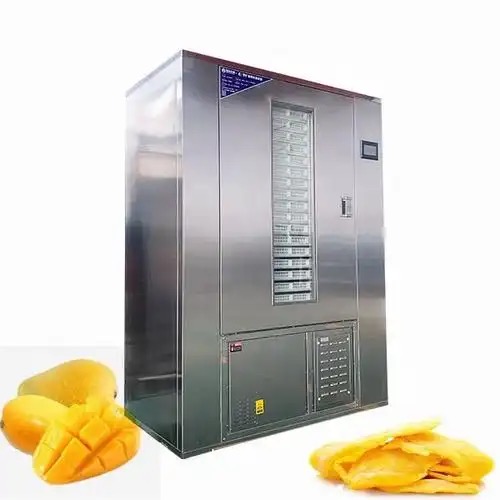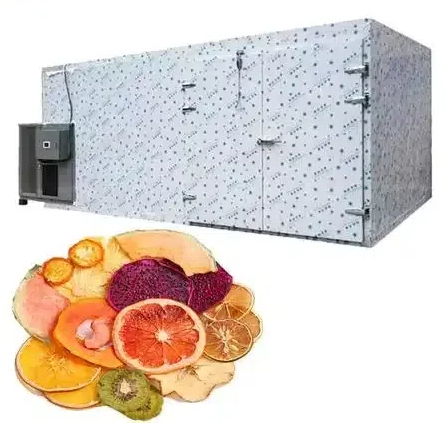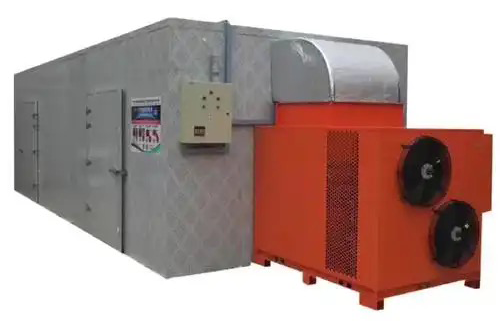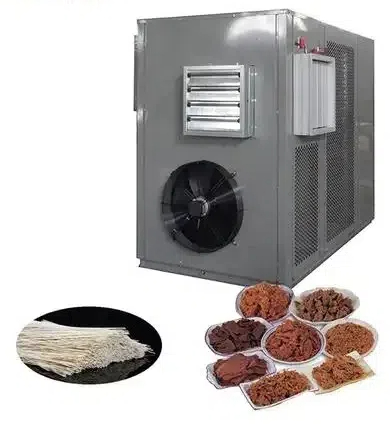
Content Menu
● Introduction
● Understanding Heat Pump Dryers
● Advantages of Heat Pump Dryers
● Traditional Dryers: A Comparison
● The Role of Heat Pump Technology in Food Drying
● Applications in Food Processing
● Cost Considerations
● Maintenance and Longevity
● Innovations in Heat Pump Drying Technology
● Environmental Impact of Food Drying
● Conclusion
● Frequently Asked Questions
>> 1. What is the main advantage of using a heat pump dryer for food?
>> 2. Can heat pump dryers handle all types of food?
>> 3. How does the drying process differ between heat pump dryers and traditional dryers?
>> 4. What maintenance is required for heat pump dryers?
>> 5. Are heat pump dryers environmentally friendly?
Introduction
In the world of food processing, drying is a crucial step that helps preserve food, enhance flavors, and extend shelf life. As a manufacturer of food dryers in China, we understand the importance of efficient drying technology. While heat pump dryers have gained popularity in the laundry sector, their application in food drying is equally significant. This article explores how heat pump dryers, such as those available at Costco, compare to traditional dryers, particularly in the context of food drying.

Understanding Heat Pump Dryers
Heat pump dryers operate on a unique principle that sets them apart from traditional dryers. They use a refrigeration cycle to extract moisture from food products. The process involves evaporating refrigerant, which absorbs heat from the air inside the dryer. This heat is then transferred to the food, causing moisture to evaporate. The moisture-laden air is then condensed, and the water is removed, allowing for continuous drying without significant energy loss.
Advantages of Heat Pump Dryers
1. Energy Efficiency: Heat pump dryers are known for their energy efficiency. They consume less electricity compared to traditional dryers, making them an environmentally friendly option. This is particularly important for food manufacturers looking to reduce operational costs.
2. Gentle Drying: The low-temperature drying process of heat pump dryers ensures that food retains its nutritional value, color, and flavor. Traditional dryers often use high temperatures, which can degrade the quality of the food.
3. Versatility: Heat pump dryers can handle a variety of food products, from fruits and vegetables to meats and herbs. This versatility makes them an excellent choice for food manufacturers with diverse product lines.
4. Consistent Results: The controlled environment of heat pump dryers allows for uniform drying, reducing the risk of over-drying or under-drying. This consistency is crucial for maintaining product quality.
5. Reduced Environmental Impact: With lower energy consumption and the ability to recycle heat, heat pump dryers contribute to a smaller carbon footprint, aligning with the growing demand for sustainable practices in food production.
Traditional Dryers: A Comparison
Traditional dryers, such as gas or electric models, have been the standard in food drying for many years. They typically use direct heat to evaporate moisture, which can lead to several drawbacks:
1. Higher Energy Consumption: Traditional dryers often require more energy to operate, leading to higher operational costs. This can be a significant concern for large-scale food manufacturers.
2. Quality Degradation: The high temperatures used in traditional drying methods can cause the loss of essential nutrients and alter the flavor and texture of food products. This is particularly detrimental for health-conscious consumers.
3. Inconsistent Drying: Traditional dryers may not provide uniform drying, resulting in some areas of the food being over-dried while others remain moist. This inconsistency can affect product quality and shelf life.
4. Limited Versatility: Many traditional dryers are designed for specific types of food, limiting their use in diverse food processing operations. This can lead to increased costs if multiple drying systems are needed.
5. Environmental Concerns: The higher energy consumption of traditional dryers contributes to a larger carbon footprint, raising concerns among environmentally conscious consumers and businesses.
The Role of Heat Pump Technology in Food Drying
Heat pump technology has revolutionized the food drying industry. By utilizing a closed-loop system, heat pump dryers can efficiently recycle heat, making them more sustainable and cost-effective. This technology allows for precise control over temperature and humidity, ensuring optimal drying conditions for various food products.

Applications in Food Processing
Heat pump dryers are suitable for a wide range of food products, including:
1. Fruits and Vegetables: Heat pump dryers preserve the color, flavor, and nutritional value of fruits and vegetables, making them ideal for snacks and ingredients in various dishes.
2. Herbs and Spices: The gentle drying process helps retain the essential oils and flavors of herbs and spices, ensuring high-quality products for culinary use.
3. Meats and Fish: Heat pump dryers can effectively remove moisture from meats and fish, extending their shelf life while maintaining taste and texture.
4. Grains and Nuts: The controlled drying environment is perfect for grains and nuts, preventing rancidity and preserving freshness.
Cost Considerations
While heat pump dryers may have a higher initial investment compared to traditional dryers, the long-term savings in energy costs and improved product quality can offset this expense. Food manufacturers should consider the total cost of ownership, including energy consumption, maintenance, and product quality, when evaluating their drying options.
Maintenance and Longevity
Heat pump dryers are designed for durability and require minimal maintenance. Regular cleaning of filters and condensate drains is essential to ensure optimal performance. With proper care, these dryers can last for many years, providing a reliable solution for food drying needs.
Innovations in Heat Pump Drying Technology
Recent advancements in heat pump drying technology have further enhanced their efficiency and effectiveness. Innovations such as smart sensors and automated controls allow for real-time monitoring of the drying process. These features enable manufacturers to adjust settings based on the specific moisture content of the food, ensuring optimal drying conditions.
Additionally, some modern heat pump dryers are equipped with features like:
1. Multi-Stage Drying: This allows for different drying phases, adjusting temperature and humidity levels throughout the process to maximize efficiency and product quality.
2. Remote Monitoring: Manufacturers can now monitor the drying process remotely, allowing for better control and adjustments without being physically present.
3. Integration with Other Food Processing Equipment: Heat pump dryers can be integrated into larger food processing systems, streamlining operations and improving overall efficiency.
Environmental Impact of Food Drying
As sustainability becomes a priority in food production, the environmental impact of food drying methods is under scrutiny. Heat pump dryers stand out as a more sustainable option due to their lower energy consumption and reduced greenhouse gas emissions. By choosing heat pump technology, food manufacturers can align their operations with global sustainability goals.
Moreover, the ability to recycle heat means that heat pump dryers can operate efficiently even in regions with limited energy resources. This adaptability makes them an attractive option for food manufacturers worldwide.
Conclusion
In conclusion, heat pump dryers represent a significant advancement in food drying technology. Their energy efficiency, gentle drying capabilities, and versatility make them an excellent choice for food manufacturers looking to improve product quality while reducing operational costs. While traditional dryers have their place, the benefits of heat pump technology cannot be overlooked.
As the food industry continues to evolve, embracing sustainable practices and innovative technologies will be crucial for success. Heat pump dryers offer a promising solution for those looking to enhance their food processing operations.

Frequently Asked Questions
1. What is the main advantage of using a heat pump dryer for food?
The main advantage is energy efficiency, which leads to lower operational costs and better preservation of food quality.
2. Can heat pump dryers handle all types of food?
Yes, heat pump dryers are versatile and can effectively dry fruits, vegetables, meats, herbs, and more.
3. How does the drying process differ between heat pump dryers and traditional dryers?
Heat pump dryers use low temperatures and a closed-loop system, while traditional dryers often use high temperatures and direct heat.
4. What maintenance is required for heat pump dryers?
Regular cleaning of filters and condensate drains is essential to maintain optimal performance.
5. Are heat pump dryers environmentally friendly?
Yes, they consume less energy and have a smaller carbon footprint compared to traditional dryers.












